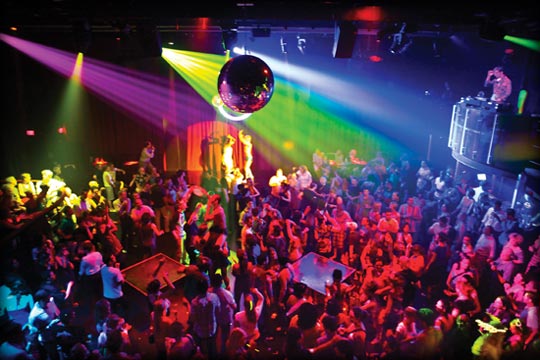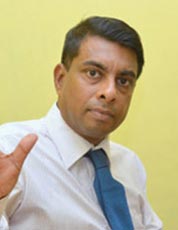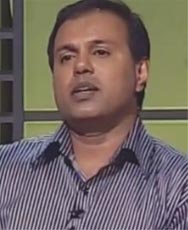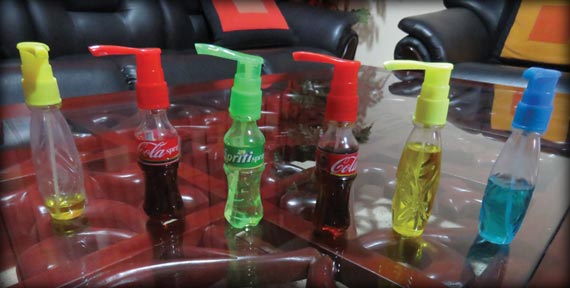 Hooked
on a high Hooked
on a high
The growing danger of students, teens, resorting to
performance enhancers that can have deadly consequence:
by Carol Aloysius
They come in attractive shades, intriguing shapes and look rather
innocuous. They could be toffees, lozenges, chewing gum, fizzy drink in
miniature bottles, fancy mouth sprays… just about anything fun and funky
and even familiar, to entice the unwitting targets, most of them young,
most of them unaware, most of them just gullible. But all eager to
experience the promise of more, better, best.
No one openly claims the fancy sweets and drinks to be what they
really are - performance enhancers, brain stimulants, tranquillisers -
designed to give a momentary high, a rush of euphoria, spike in self
esteem, an all conquering feeling. But the danger of this wilful myopia
is that these performance enhancers, no matter the pretty packaging and
name tags, are addictive, extremely dangerous and could even lead to
life threatening consequence.
|

Dr Waruna Gunathilake |
It is all too easy to understand why impressionable youth, especially
the teens, eager to get off the grind and become a ‘super performer’ in
school, on the field, even on the dance floor, would resort to these
enhancers, and why their use has become so widespread. And a faulty,
over academic oriented education system that allows its students little
or no time for play and creative work, only adds to the minefield of
reasons.
|

Dr Chamira Nalinga Samarasinghe, |
Many of those closely involved in youth affairs blame the education
system, parents and pharmaceutical companies, especially the
pharmaceutical companies for resorting to unethical methods of promoting
these enhancers, while officials at the Poisons Information Centre blame
it on the lack of proper regulations and control of the drug trade.
School children
Commenting on why school children especially those sitting public
exams like the GCE O/L and GCE A/L exams are now increasingly becoming
addicted to performance enhancers such as Cola Spray and chewing gum,
Chairman National Dangerous Drugs Control Board, Dr Chamira Nalinga
Samarasinghe, said unhesitatingly, “It’s our present education system
that is largely to blame. While the end goal is to produce good academic
results, it is not geared for the innovative and creative child,” and
claimed that research studies carried out over the past two months,
where they talked the youth (including school children) undergoing
rehabilitation programmes for drug abuse, had revealed that many of
students have very little time for play or recreational activities.
|
Case studies
An A/L student attending a leading Colombo
school holding up an empty Cola spray bottle says, “I was
unable to concentrate on my studies and afraid I wouldn’t be
able to pass the exam. I’ve only used two of them so far but
I don’t see any improvement in my school grades. In fact
they have gone down”.
A young adult admitting he was looking for
an ‘escape’ drug to withdraw from the grim realities of the
world, however denies this. “It has helped me to do just
that. But I’ll probably need to continue using it
indefinitely till I find a newer drug”. |
|
Raids
uncovered
-Several varieties of toffees and
sweets suspected to contain intoxicants and harmful to
health sold at shops around schools in Kalutara,
Payagala, Beruwala, Aluthgama and Dharga Town.
*Drug racket involving two suspects in
Hatton selling prescribed drugs for mental patients.
Seventy three tablets seized. Police said it intoxicates
healthy persons and the tablets were sold at twice its
usual price due to heavy demand.
*Last week several persons at
Dematagoda nabbed selling Cola Spray.
*Police officer of the CID alleged to
be involved in the racket.
*Youth nabbed with Cola spray bottle
in the Fort |
“They wake up at 5 in the morning, go to school, and then attend
tuition classes and extracurricular classes. So they are very tense and
unhappy. When they go home, many of these children have no mother to
give them a meal. Many are left to their own devices while their parents
are at work. They then become addicted to the computer, smart phone or
stay glued to the television watching unsuitable films, as there is no
parental supervision,” he said, adding, “Or take to drugs”.
As for what kind of drugs, he said traditionally it used to be stuff
like heroin and cannabis, but the new trend now was Ecstacy, Ice,
amphetamines, methamphetamines and cathinone. All of these are
psychotropic drugs, man-made and used as stimulants.
Cola Spary
As for Cola Spray, which is brought into the country illegally and
which is gaining popularity among school children, Dr. Samarasinghe said
it did not contain narcotics, but added, “However, we are still doing
tests to see if they have intoxicants that stimulate the child’s brain.”
He also said these enhancers usually triggered off mood changes,
aggressiveness and hysteria. “Because school children are mentally
fragile they can get hysteria,” explain that if a student, or even an
adult has already taken cannabis or even sex stimulants, which are also
becoming very popular these days, and thereafter imbibed a sugary syrup,
it would enhance the effects of the drugs causing irritability and
aggressiveness. That’s what happened to some school boys who were
arrested the other day in the heart of Colombo,” he pointed out.
Mood swings
|
Solutions
So what is the solution to the increasing
drug usage by children? An official of the Ministry of
Education said Ministry was currently mulling over the
question of giving more time for play during school hours.
“It is now compulsory that children take part in at least
ten minutes of physical exercise before going to their
classrooms, so that it raises their oxygen levels and helps
them think better. That way they may not need to look for
drugs to perform better in their classrooms”.
Dr Samarasinghe said the NDCDB was
establishing Committees in schools headed by the Principals
and represented by teachers, prefects, the PIC closest to
the school and parents. “We train the teachers every month
on counselling with special attention to school drop outs,”
he said, but claimed that the number of professional
counsellors was still depressingly low.
Consultant Community Physician, Schools
Unit, Family Health Bureau, Dr Ayesha Lokubalasuriya said
there was an urgent need to provide counselling for school
children and life skills education for school leavers. |
He said the symptoms were long term, but curable if discovered in the
initial stages. “Unfortunately these symptoms appear only after they
have passed their twentieth birthday,” he said, urging parents to be
more vigilant to their school going children who show behavioural
changes and become aggressive and irritable for no reason.
|
Tip of the
iceberg
A psychiatrist speaking on grounds of
anonymity said school children by nature were adventurous
and curious. He said: “They like experimenting with anything
new. That includes any new drug that claims they could
perform better in their exams. The problem is that once they
test a drug they get a craving for more. If it offers them a
way to do well in their highly competitive exams, they won’t
hesitate taking them and demand for more. Cola Spray and the
new chewing gum also believed to contain some intoxicants
give are just the tip of the iceberg. Unless our authorities
take immediate steps to control this flood of dangerous
intoxicants, many more will follow in even more seductive
and appealing colours and shapes”. |
A paediatrician who refused to divulge his name said he was now
seeing more school children with mood swings and behavioural changes.
“Although we can’t directly link them to the stimulants now circulating
in the market, is possible these symptoms are interlinked”.
Head of the National Poisons Information Centre, Dr Waruna
Gunathilake admitted that some paediatricians had shared this opinion
with him due to their concern about potential health risks teenagers
faced.
He also warned that children were increasingly using drugs that have
been medically prescribed for certain neurological reasons. “This is
because pharmacies dispensing them are not insisting on a doctor’s
prescription many patients who are regular users tell us they can get
them without a prescription, since the pharmacists know them by sight.
That creates a dangerous precedent as the drug can fall into the
wrong hands like school children who don’t have a neurological disorder”
He is of the view students, resort to these drugs probably because
they believe these will help calm them down when they are about to sit
an exam”.
Sexual stimulants
He alleged that even sexual stimulants or enhancers were now readily
available without prescription at some pharmacies. “These too should
only be given on a doctor’s prescription. But that is not happening. In
fact there is such a huge demand for them from our youth, including
school children in the higher classes who want to experiment with their
body, it has become a big time business,” he said, insisting that the
culprits be identified and the sale of these drugs controlled and
regulated.
 He
recalled when popular brand of cough syrup had to be temporarily banned
and is now only sold in government outlets, when it was alleged to have
caused the death of some students who had ingested it. “As I recall, it
was a time when there was a scarcity of heroin in the local market.
Regular users who experienced withdrawal symptoms then began taking this
syrup as it acted on the central nervous system and gave them a sense of
tranquillity and calmed them down,” he said. He
recalled when popular brand of cough syrup had to be temporarily banned
and is now only sold in government outlets, when it was alleged to have
caused the death of some students who had ingested it. “As I recall, it
was a time when there was a scarcity of heroin in the local market.
Regular users who experienced withdrawal symptoms then began taking this
syrup as it acted on the central nervous system and gave them a sense of
tranquillity and calmed them down,” he said.
Dr. Gunathilake said the same thing applies to the Ecstacy drug, now
available at most high end night clubs. “It also acts on the central
nervous system causing euphoria and tranquillity,” he said, but warned
that has deadly side effects, including serious cardiovascular and brain
function problem, which the users are not aware of. “If a child were to
ingest it accidentally, the results could be fatal,” he cautioned. |

